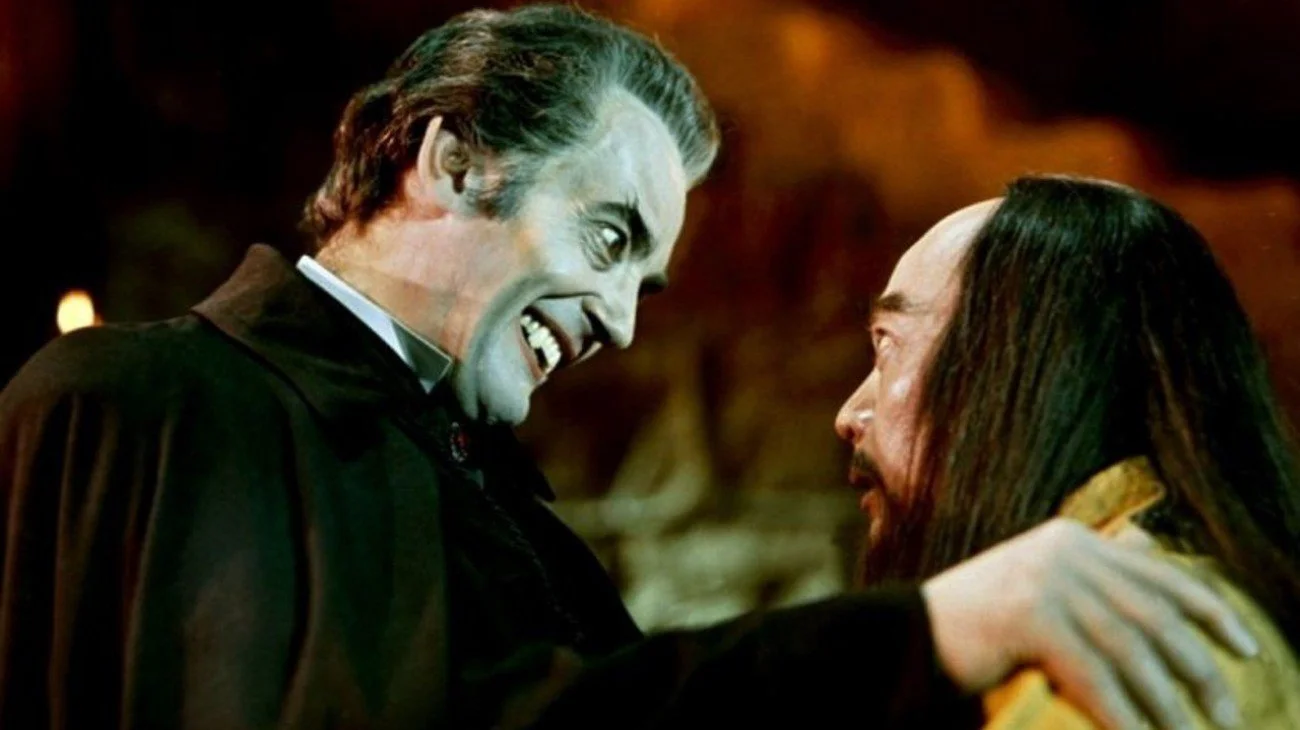I love a good genre mashup. Their success might be gauged by how well they blend, or subvert, each genre’s respective rules. The results are usually quirky and interesting, due to this process. In 1974, two legendary studios, the British horror-oriented Hammer Film Productions and the Hong Kong-based Kung Fu-popularizing Shaw Brothers Studio, joined forces for The Legend of the 7 Golden Vampires. Directed by Roy Ward Baker and an uncredited Chang Cheh, the mixture is sometimes awkward but mostly fun. As it was initially released in Hong Kong on July 11th, 1974, I decided to look back for its 50th birthday.
The film begins with a prolog set in 1804 where a Chinese priest (Shen Chan) travels to Transylvania to beseech Dracula (John Forbes-Robertson) to accompany him back to China to re-empower his undead masters, the titular seven golden vampires. Dracula agrees but absorbs and takes on the form of the priest to be able to travel during the day. We then move to the present day of 1904, where the renowned vampire hunter Professor Lawrence Van Helsing (regal Peter Cushing) lectures at Chungking University on the history of Chinese vampires.
Most of the students dismiss him as a kook, but Hsi Chang (fan favorite David Chiang) knows that Van Helsing is telling the truth. See, Chang’s grandfather was the focus of Van Helsing’s seminar. Chang recruits Van Helsing and his son Leyland (Robin Stewart) to travel to his ancestral village to destroy the vampires, though no one has any inkling that Dracula is involved.
Widowed heiress Vanessa Buren (Julie Ege), a new acquaintance of Leyland’s, agrees to fund the expedition on the caveat that she is allowed to make the journey, as well. Chang’s sister Mei Kwei (Szu Shih) and six brothers, all of whom are Kung Fu experts, act as security for the trip. After an arduous and perilous trek across the Chinese countryside that includes a confrontation with bandits and an ambush by three of the vampires and a squad of their zombie slaves, the group arrives at the ravaged village and faces the full force of the remaining vampires, their zombie slave army, and Dracula himself.
The only problems I have with the film are all derived from Don Houghton’s script. I may be wrong, but it’s never explained how Dracula could have been residing in rural China for a century while also facing off against Van Helsing in Europe in the years leading up to the film’s present. This is a pretty glaring plot hole. Additionally, Houghton has trouble incorporating the European characters into the narrative once the journey to the village begins. They generally stand around and watch the Kung Fu fighting. Cushing is mostly wasted and his confrontation with Dracula in the film’s closing moments is extremely anticlimactic.
So, what does work? Even though Houghton has difficulty bridging the horror and action, Baker and Cheh are still able to wring some moodiness out of the piece. Cinematographers John Wilcox and Roy Ford as well as the production design assistant here, as Dracula’s castle, the Chinese countryside, the cave set, the village, and the vampires’ domicile all look incredibly cool. The scabrous visage of the vampires is effectively creepy and sets them apart from their Western brethren. They’re also convincing as both monsters and Kung Fu masters.
The zombies look a little hokier, especially with the odd creative choice of having them kind of hippity-hop as they march, but the shots of them emerging from their graves are fun. Action sequences are fantastic, with dozens of fighters hacking, slicing, and jumping all over the screen. The gore isn’t shocking to modern eyes, but there’s a decent amount of blood involved. The disintegration of the undead, whenever they’re dispatched, is well done and even a little gross when their eyeballs sink into their faces and dissolve. James Bernard’s score nicely alternates between eeriness and bombast.
As I stated above, Cushing is mostly wasted, and you could remove most of the European characters and the story wouldn’t change much. Still, his presence brings some gothic gravitas to the piece. Chiang feels like the true star of the effort and he owns the flick’s midsection. Ege is a little wooden, but I think that might just be due to English not being her native language.
Roy Ward Baker and Chang Cheh’s The Legend of the 7 Golden Vampires doesn’t completely work, however, there’s plenty to enjoy. It sounds like the production was a little rocky, with the marriage between the Eastern and Western contingents in various facets not exactly being harmonious. The film was basically a flop at the box office, too. Again, though, I always have fun with it and I think it has all the makings of an interesting flick for cult aficionados. Recommended for fans of Big Trouble in Little China, From Dusk Till Dawn, and Blade.
Michael Cavender





